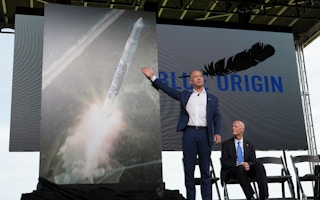“A long time ago, in a galaxy far far away…”
…a small blue planet grew more and more fascinated by what lay beyond its planetary boundaries. Many of us young Skywalkers (and princess Leia’s) have turned our heads to the sky and dreamed about spaceships, aliens, and traveling at the speed of light.
While the race to colonialise the Moon ended with the Cold War, the exploration (and commercialisation) of space is back on the agenda. With entrepreneurs Jeff Bezos and Richard Branson each spending a few minutes (and a couple billions of dollars) in Earth’s orbit, the commercial space race is on.
But are space travel and sustainability compatible? It’s not like we have a shortage of problems on the Earth to fix. But the wheels of space research are already turning and cannot exactly be stopped at this point.
What does the data tell us?
Space companies are traditionally defence firms posing an interesting question for sustainability investors who typically screen-out weapons-related businesses. The likes of Lockheed Martin, BAE Systems or Northrop Grumman are leaders not just in weapons manufacturing, but also space technology. However, there is a new breed of space companies on the horizon.
Listed in 2019, Virgin Galactic is the first publicly-traded space tourism company. The company’s Environment score (E in the ESG) is at a mere 32/100*, with low 30s* in Emissions, Environmental Solutions or Environmental Stewardship. This comes as no surprise as the Virgin VSS Unity spaceship runs on a combination of highly polluting fuels. Similarly, one SpaceX launch emits as much as 336 metric tonnes of CO2, enough to drive your car around the world 70 times. Bezos’ Blue Origins uses hydrogen fuel which does not emit carbon — though its production often does.
Conversation on the emissions caused by space travel will inevitably increase, and lead us to differentiate between space exploration (research) and space tourism which provides no tangible benefit to society beyond providing entertainment to the ultra-wealthy.
What can we do?
How does one go about allocating a proportion of their sustainable portfolio to “space”? And what’s would be the motivation given that we may never sit in a rocket ourselves?
One must realise that the topic of space goes beyond rockets. In many cases, space-related research has resulted in life-changing discoveries including satellite technology which today serves a vital function in measuring and tracking the climate crisis. The vital role of space research in society is reflected in space-related ETFs such as ARK’s ARKX or HanETF’s YODA, where we find names such as Nvidia, Tencent or partial allocations into a 3D ETF.
All in all, we haven’t come across financial products that look at space from a sustainability driven perspective with much investor focus still on the military application of space research. So, we will leave it for you to decide whether to support the “Light” or “Dark” side of space innovation … to infinity and beyond.
Arabesque is a global group of financial technology companies offering sustainable investment, advisory, and data services through advanced ESG and AI capabilities.


















